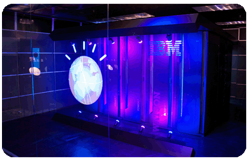 The nation’s first impression of the IBM supercomputer Watson came from the machine’s unprecedented appearance on Jeopardy. Over the course of a week, Watson handily defeated the best champions in the quiz show’s history thanks to its massive memory bank of facts. But it’s not just the supercomputer’s super-sized hard drive that sets it apart from other machines. Watson could compete on Jeopardy autonomously thanks to its ability to answer questions posed in natural language.
The nation’s first impression of the IBM supercomputer Watson came from the machine’s unprecedented appearance on Jeopardy. Over the course of a week, Watson handily defeated the best champions in the quiz show’s history thanks to its massive memory bank of facts. But it’s not just the supercomputer’s super-sized hard drive that sets it apart from other machines. Watson could compete on Jeopardy autonomously thanks to its ability to answer questions posed in natural language.
It’s this feature that will prove Watson’s worth outside of the game show circuit. The supercomputer mimics human cognition, only on a grand scale. Not only can Watson instantly access its archive of more than 200 million pages of data, it can also process that information within the parameters of a critical thinking question. For instance, when it comes to diagnosing and treating cancer, doctors have an almost infinite number of avenues they can pursue. One strain of lung cancer requires a patient to take two drugs from a possible list of 16, leaving the doctor to puzzle out the best course of action out of 100 combinations. With more than 230,000 Americans expected to be diagnosed with lung cancer next year, physicians fear they won’t have the time to properly assess the treatment of each case.
That’s where Watson comes in. In order to make the supercomputer an expert on cancer treatment, researchers fed it 600,000 pieces of medical evidence and 2 million pages of text from journals and clinical trials. From there, IBM and its partners developed a cloud-based program for oncologists to use in their diagnoses. Now Watson can do in seconds what would take hours for even the most capable doctors. The supercomputer’s abilities have attracted interest from places besides the medical field as well. Macy’s wants to use Watson to interpret the social signals of millenials, while Kroger employs elements of the supercomputer’s technology to anticipate customer questions. Meanwhile, IBM hopes that Watson will become a primary revenue generator in years to come. After all, the tech giant has spent $24 billion over the past eight years developing Watson to become the machine it is today. If the computer can do everything else under the sun, it has to start paying itself off sometime.
Questions:
- How will IBM recoup its vast investment in Watson?
- Are supercomputers going to limit employment opportunities for college grads?
Source: Jessi Hempel, “IBM’s Massive Bet on Watson,” Fortune, 09/19/13. Photo by John Tolva.
